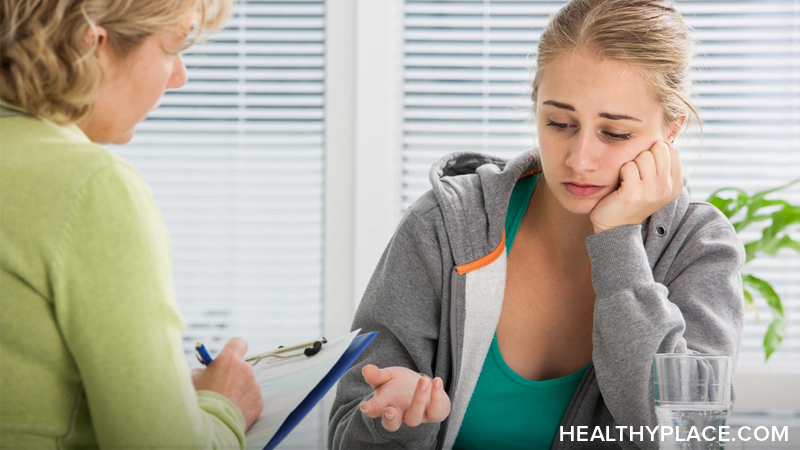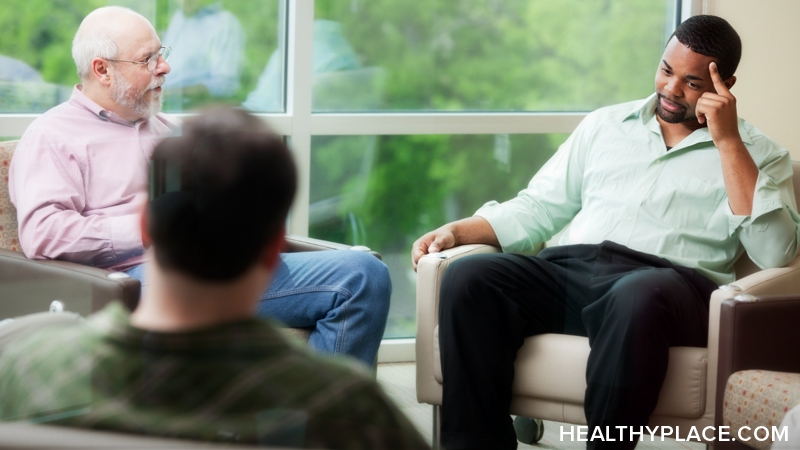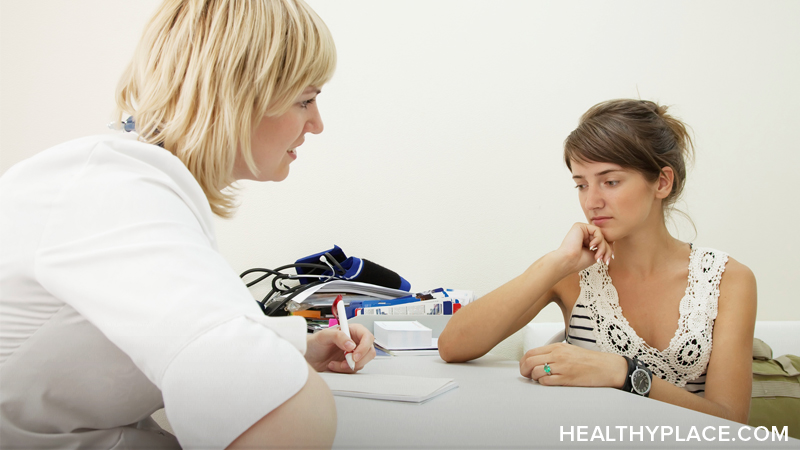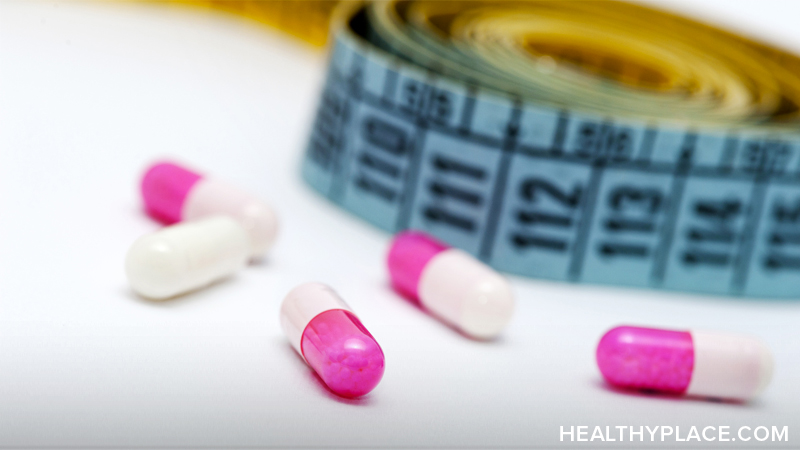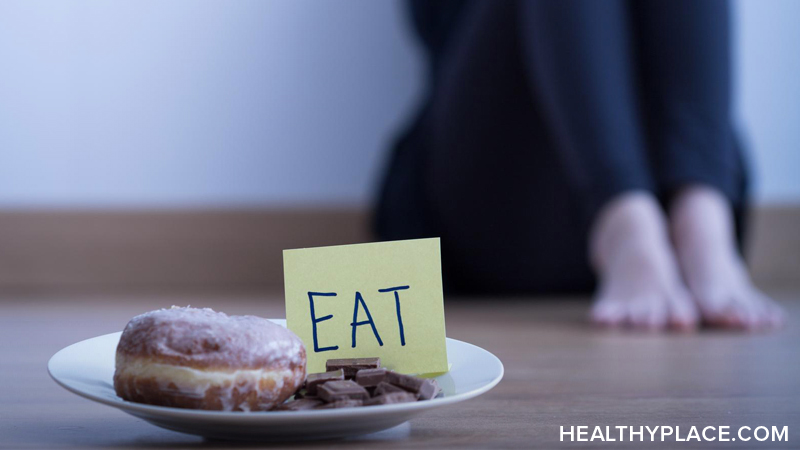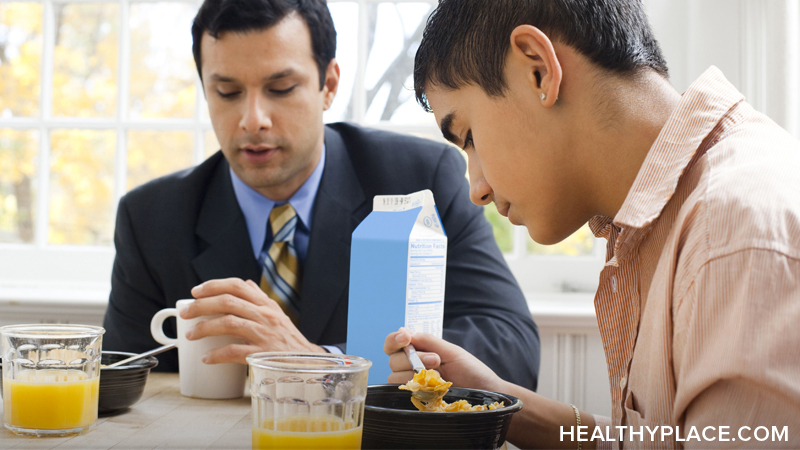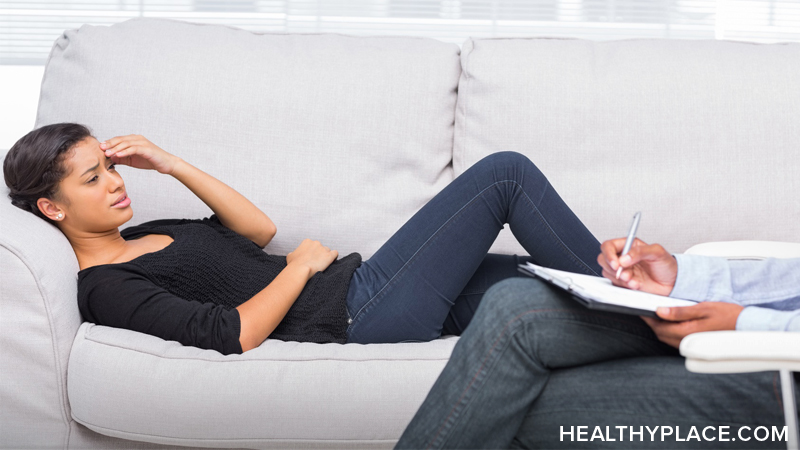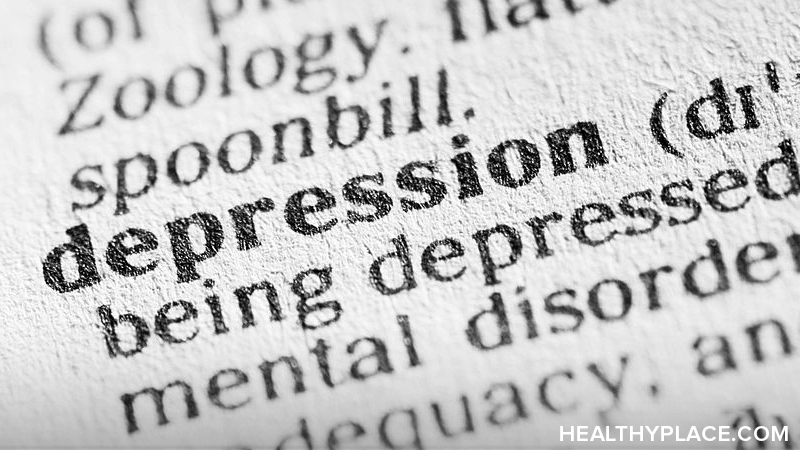
Depression Information
What is Depression? Depression Definition and Checklist
1Medscape Reference, Depression: http://emedicine.medscape.com/article/286759
2WebMD, Mental Health and Adjustment Disorder: http://www.webmd.com/mental-health/mental-health-adjustment-disorder
Types of Depression – Different Types of Depression
1General reference for article: Medscape Reference, Depression: http://emedicine.medscape.com/article/286759
2Medscape Reference, Dysthymic Disorder: http://emedicine.medscape.com/article/913941
Signs of Depression: Depression Warning Signs
1HelpGuide.org, Understanding Depression: http://helpguide.org/mental/depression_signs_types_diagnosis_treatment.htm
Depression Diagnosis and How is Depression Diagnosed?
1American Psychiatric Association. Diagnostic and Statistical Manual of Mental Disorder, Text Revision. 4th Edition. Washington, DC: American Psychiatric Association; 2000.
2Medscape Reference, Depression: http://emedicine.medscape.com/article/286759-clinical
3Medscape Reference, History and Mental Status Evaluation: http://emedicine.medscape.com/article/293402
Depression Facts – Depression Statistics
1Medscape Reference, Depression: http://emedicine.medscape.com/article/286759-clinical
2Livestrong.com, Long-Term Effects of Untreated Depression: http://www.livestrong.com/article/69705-longterm-effects-untreated-depression/
Depression Test for Teenagers
1National Institute of Mental Illness, Depression in Children and Adolescents (Fact Sheet): http://www.nimh.nih.gov/health/publications/depression-in-children-and-adolescents/index.shtml
How Do I Use the FMLA as an Employee with Depression?
Advisors Law Group, “FMLA – Does Depression Qualify.” Federated Employment Practices Network, 2014.
Mental Health America, “Can I Use FMLA for Mental Health?” Accessed November 19, 2019.
United States Department of Labor, “Fact Sheet #28: The Family and Medical Leave Act.” Accessed November 19, 2019.
United States Department of Labor, “Need Time: The Employee’s Guide to the Family and Medical Leave Act.” Accessed November 20, 2019.
Is Depression a Disability? Can You Get Accommodations?
Accommodations for disabilities. Anxiety and Depression Association of America (ADAA). Retrieved October 2019 from https://adaa.org/understanding-anxiety/obsessive-compulsive-disorder-ocd/college-students/accommodations
Can I work with depression? (n.d.). Disability Benefits Center. Retrieved October 2019 from https://www.disabilitybenefitscenter.org/disability-work/depression
Dejesus, A. (2017). Depression and the VA. Hill & Ponton. Retrieved October 2019 from https://www.hillandponton.com/depression-and-the-va/
How to get a higher VA disability rating for depression. (2019). Veterans Disability Information. Retrieved October 2019 from https://www.veteransdisabilityinfo.com/blog.php?article=get-a-higher-va-disability-rating-for-depression_386
Is depression a disability? (2019). Better Help. Retrieved October 2019 from https://www.betterhelp.com/advice/depression/is-depression-a-disability/
Major depression. (n.d.) National Institute of Mental Health. Retrieved October 2019 from https://www.nimh.nih.gov/health/statistics/major-depression.shtml
Morton, D. (n.d.). Social security disability and SSI for depression. Disability Secrets. Retrieved October 2019 from https://www.disabilitysecrets.com/win-can-you-get-disability-for-depression.html
Thompson, K. (n.d.). Depression and disability: A practical guide. The North Carolina Office on Disability and Health. Retrieved October 2019 from https://fpg.unc.edu/sites/fpg.unc.edu/files/resources/other-resources/NCODH_Depression.pdf
What is the History of Depression?
Horowitz, A., Luaces-Lorenzo, L., & Wakefield, C. (2016). History of Depression. In R.J. DeRubeis & D. R. Strunk (Eds.), The Oxford Handbook of Mood Disorders (pp. 1-24). Oxford, England: Oxford University Press. Retrieved November 2019 from https://www.researchgate.net/publication/301219610_History_of_Depression
Paykel, E.S. (2008). Basic concepts of depression. Dialogues in Clinical Neuroscience, 10(3), 279-289. Retrieved November 2019 from https://www.ncbi.nlm.nih.gov/pmc/articles/PMC3181879/
Schimelpfening, N. (2019). The history of depression. verywell mind. Retrieved November 2019 from https://www.verywellmind.com/who-discovered-depression-1066770
Can You Help Me Understand Depression? Depression Explained
American Psychiatric Association. (2013.). Diagnostic and statistical manual of mental disorders, fifth edition. Arlington, VA: American Psychiatric Association.
Depression explained. (n.d.). Better Health Victoria. Retrieved November 2019 from https://www.betterhealth.vic.gov.au/health/conditionsandtreatments/depression
Lazarus, C. (2017). Understanding depression: Why depression is a potentially incapacitating and sometimes lethal illness. Psychology Today. Retrieved November 2019 from https://www.psychologytoday.com/us/blog/think-well/201711/understanding-depression
Understanding depression. (n.d.). neuroCare. Retrieved November 2019 https://www.neurocaregroup.com/understanding-depression.html
Depression Prevention: Is It Possible to Prevent Depression?
Cuijpers, P., Beekman, A. T. F., & Reynolds, III, C. F. (2012, March 14). Preventing depression. JAMA, 307 (10), 1033-1034. doi: 10.1001/jama.2012.271
Muñoz, R. F., Cuijpers, P., Smit, F., Barrera, A. Z., & Leykin, Y. (2010).Prevention of major depression. Annual Review Clinical Psychology, 6, 181–212. https://doi.org/10.1146/annurev-clinpsy-033109-132040
Smit, F., Willemse, G., Koopmanschap, M., Onrust, S., Cuijpers, P., & Beekman, A. (2006). Cost-effectiveness of preventing depression in primary care patients: Randomised trial. British Journal of Psychiatry, 188, 330–336. https://doi.org/10.1192/bjp.188.4.330
World Health Organization. (2019, December 4). Depression. Retrieved from: https://www.who.int/en/news-room/fact-sheets/detail/depression
Depression Pictures of Famous People
7 athletes speaking out about anxiety, depression, and bipolar disorder. (n.d.). bpHope. Retrieved
February 2020 from https://www.bphope.com/bipolar-buzz/athletes-stigma-anxiety-depression-bipolar/
30 famous people alive today who have battled depression. (n.d.). Social Work Degree Guide. Retrieved
February 2020 from https://www.socialworkdegreeguide.com/30-famous-people-alive-today-battled-depression/
Celebrities with depression. (2018). WebMd. Retrieved February 2020 from
https://www.webmd.com/depression/ss/slideshow-depression-celebs
Crofts, C. (2017). Ellen DeGeneres talks about her battle with depression. Smooth FM. Retrieved
February 2020 from https://www.smooth.com.au/entertainment/clone-ellen-degeneres-opens-about-being-bullied/
Elizabeth, D. (2020). Katy Perry opens up about experiencing depression. Teen Vogue. Retrieved
February 2020 from https://www.teenvogue.com/story/katy-perry-depression-mental-health-journey
Higgins, C. (2017). Wayne Brady: “I had a complete breakdown.” BlackDoctor.Org. Retrieved February
2020 from https://blackdoctor.org/450755/wayne-brady-depression/
Scutti, S. (2018). Michael Phelps: 'I am extremely thankful that I did not take my life.’ CNN. Retrieved
February 2020 from https://www.cnn.com/2018/01/19/health/michael-phelps-depression/index.html
Depression Movies and Videos You Have to See
Film therapy: The benefits of watching movies. (2016). Exploring Your Mind. Retrieved February 2020
from https://exploringyourmind.com/film-therapy-benefits-watching-movies/
Mann, D. (2009). Movie therapy: Using movies for mental health. WebMD. Retrieved February 2020
from https://www.webmd.com/mental-health/features/movie-therapy-using-movies-for-mental-health#1
Movie therapy. (2015). Good Therapy. Retrieved February 2020 from
https://www.goodtherapy.org/learn-about-therapy/types/movie-therapy
Symptoms of Depresion
What Are the Symptoms of Depression and Depressive Disorder?
Burgess, L., “What Is Psychomotor Agitation?” Medical News Today, October 17, 2017.
Dictionary.com, Psychomotor Retardation. Retrieved November 7, 2019.
Halverson, J., Depression. Medscape, Updated October 7, 2019.
Weiller, E., et al, “Prevalence of Brief Recurrent Depression in Primary Care”. European Archives of Psychiatry and Clinical Neuroscience, November 1994.
How Can I Deal with All of This Anger from Depression?
Anxiety and Depression Association of America, Depression. Accessed November 11, 2019.
Fisher, L., et al, “The Role of Anger/Hostility in Treatment-Resistant Depression: A Secondary Analysis from the ADAPTY-A Study.” The Journal of Nervous and Mental Disease, October 2015.
NHS, Anger. Updated October 2019.
Ou, C., Hall, W., “Anger in the Context of Postnatal Depression: An Integrative Review.” Birth, December 2018.
Sahu, A., et al, “Depression Is More Than Just Sadness: A Case of Excessive Anger and Its Management in Depression.” Indian Journal of Psychological Medicine, January 2014.
What Are the Physical Symptoms of Depression?
Halverson, J., Depression Clinical Presentation. Medscape, October 2019.
Trivedi, M., “The Link Between Depression and Physical Symptoms.” Primary Care Companion to the Journal of Clinical Psychiatry. 2004.
Depression and Motivation: Why Can’t I Get Moving?
Halverson, J., Depression Clinical Presentation. Medscape, October 2019.
MedicalNewsToday, “Tips for Finding Motivation with Depression.” Accessed November 18, 2019.
Sherdell, L., et al, “Anticipatory Pleasure Predicts Motivation for Reward in Major Depression.” Journal of Abnormal Psychology, February 2012.
Is This Depression or Laziness? How to Tell the Difference
Baddeley, J. (2009). The laziness myth. Does laziness exist? Psychology Today. Retrieved November 2019 from https://www.psychologytoday.com/us/blog/embracing-the-dark-side/200903/the-laziness-myth
Barhum, L. (2018). Why does depression make you feel tired? Medical News Today. Retrieved November 2019 from https://www.medicalnewstoday.com/articles/322264.php
Blurt Team. (2017). Depression: We’re not being lazy. Blurt. Retrieved November 2019 from https://www.blurtitout.org/2017/09/12/depression-were-not-being-lazy/
Burton, N. (2014). The psychology of laziness. Psychology Today. Retrieved December 2019 from https://www.psychologytoday.com/us/blog/hide-and-seek/201410/the-psychology-laziness
Ghanean, H., Ceniti, A.D., & Kennedy, S.H. (2018). Fatigue in patients with major depressive disorder: Prevalence, burden, and pharmacological approaches to management. CNS Drugs, 32(1), 65-74. Retrieved November 2017 from https://link.springer.com/article/10.1007%2Fs40263-018-0490-z
Smith, P. (2019). Why depression makes you so damn tired all the time. HuffPost. Retrieved November 2019 from https://www.huffpost.com/entry/depression-tired_l_5c6c3fcae4b012225acd8663
What’s the Relationship Between Depression and Sleep?
Depression and sleep. (n.d.). National Sleep Foundation. Retrieved November 2019 from https://www.sleepfoundation.org/articles/depression-and-sleep
Depression and sleep: Understanding the connection. (n.d.). Johns Hopkins Medicine. Retrieved November 2019 from https://www.hopkinsmedicine.org/health/wellness-and-prevention/depression-and-sleep-understanding-the-connection
Harvard Mental Health Letter. (n.d.). Sleep and mental health. Harvard Health Publishing. Retrieved November 2019 from https://www.health.harvard.edu/newsletter_article/sleep-and-mental-health
Nyer, M., Farabaugh, A., Fehling, K., Soskin, D., Holt, D., Papakostas, G.I., Pedrelli, P., Fava, M., Pisoni, A., Vitolo, O., & Mischoulon, D. (2013). Relationship between sleep disturbance and depression, anxiety, and functioning in college students. Depression and Anxiety, (30), 9, 873-880. Retrieved November 2019 from https://www.ncbi.nlm.nih.gov/pmc/articles/PMC3791314/
How to Deal with Depression and Fatigue
Aiken, C. (2019). Two ways to treat fatigue in bipolar and depression. Psychiatric Times. Retrieved December 2019 from https://www.psychiatrictimes.com/bipolar-disorder/two-ways-treat-fatigue-bipolar-and-depression
Barhum, L. (2018). Why does depression make you feel tired? Medical News Today. Retrieved November 2019 from https://www.medicalnewstoday.com/articles/322264.php
Jaret, P. (n.d.). Depression and insomnia. WebMD. Retrieved December 2019 from https://www.webmd.com/depression/features/sleep-problems#1
Peterson, T.J. (2018). List of best foods for fighting depression. HealthyPlace. Retrieved December 2019 from https://www.healthyplace.com/depression/food-and-depression/list-of-best-foods-for-fighting-depression
Self-help tips to fight tiredness. (2018). National Health Service (NHS) UK. Retrieved December 2019 from https://www.nhs.uk/live-well/sleep-and-tiredness/self-help-tips-to-fight-fatigue/
How to Deal with Depression and Weight Loss or Weight Gain
Allen, J. (n.d.). Why does depression cause you to lose weight even thought you eat a lot? Livestrong. Retrieved December 2019 from https://www.livestrong.com/article/330360-why-does-depression-cause-you-to-lose-weight-even-though-you-eat-a-lot/
Holland, K. (2018). Are obesity and depression related? And 9 other FAQs. Healthline. Retrieved December 2019 from https://www.healthline.com/health/depression/obesity-and-depression
Jennings, K. (2018). 16 simple ways to relieve stress and anxiety. Healthline. Retrieved December 2019 from https://www.healthline.com/nutrition/16-ways-relieve-stress-anxiety
Radcliffe, S. (2019). Here’s how treating obesity and depression at the same time can help. Healthline. Retrieved December 2019 from https://www.healthline.com/health-news/study-finds-best-way-to-help-people-with-depression-lose-weight
Shimer Bowers, E. (2012). Weight management tips for people with depression. Everyday Health. Retrieved December 2019 from https://www.everydayhealth.com/hs/major-depression/weight-management-for-depression/
Stoller-Conrad, J. (2015). Microbes help produce serotonin in gut. Caltech. Retrieved December 2019 from https://www.caltech.edu/about/news/microbes-help-produce-serotonin-gut-46495
What to Do When Depression and Loneliness Overtake You
Broderick, P.C. & Blewitt, P. (2006). The life span: Human development for helping professionals (2nd Ed.). Upper Saddle River, NJ: Pearson Merrill Prentice Hall.
Horne, C. (2019). The cycle of depression loneliness. betterhelp. Retrieved December 2019 from https://www.betterhelp.com/advice/loneliness/the-cycle-of-depression-loneliness/
McLeod, S. (2018). Maslow’s hierarchy of needs. Simply Psychology. Retrieved December 2019 from https://www.simplypsychology.org/maslow.html
Whitbourne, S. (2018). 5 ways to keep loneliness from turning into depression. Psychology Today. Retrieved December 2019 from https://www.psychologytoday.com/us/blog/fulfillment-any-age/201811/5-ways-keep-loneliness-turning-depression
Ypsilanti, A., Lazuras, L., Powell, P. & Overton, P. (2018). Self-disgust as a potential mechanism explaining the association between loneliness and depression. Journal of Affective Disorders, 243, 108-115. Retrieved December 2019 from https://www.ncbi.nlm.nih.gov/pubmed/30241025
Depression and Crying: Why Can’t I Just Stop Crying?
Gračanin, A., Bylsma, L. M., & Vingerhoets, A. J. J. M. (2014) Is crying a self-soothing behavior?. Frontiers in Psychology, 5(502). Retrieved December 2019 from https://www.researchgate.net/publication/262664292_Gracanin_A_Bylsma_L_M_Vingerhoets_A_J_J_M_2014_Is_crying_a_self-soothing_behavior_Frontiers_in_Psychology_5_502_doi_103389fpsyg201400502#pfe
York Morris, S. (2018). Why can’t I stop crying? healthline. Retrieved December 2019 from https://www.healthline.com/health/i-cant-stop-crying
Why Does Depression Cause Memory Loss?
Beblo, T., Kater, L., Baetge, S., Driessen, M., & Piefke, M. (2016). Memmory performance of patience with major depression in an everyday situation. Psychiatry Research, 248, 28-34. Retrieved December 2019 from https://www.sciencedirect.com/science/article/abs/pii/S0165178116308666
Sapolsky, R.M. (2001). Depression, antidepressants, and the shrinking hippocampus. Proceedings of the National Academy of Sciences of the United States of America, 98(22), 12320-12322. Retrieved December 2019 from https://www.ncbi.nlm.nih.gov/pmc/articles/PMC60045/
Scaccia, A. (2016). Can depression cause memory loss? healthline. Retrieved December 2019 from https://www.healthline.com/health/depression/depression-and-memory-loss
Westman, N. (2019). Depression’s impact on memory. BrainFacts.org. Retrieved December 2019 from https://www.brainfacts.org/diseases-and-disorders/mental-health/2019/depressions-impact-on-memory-022119
What’s a Depression Attack? How Do I Fight Back?
American Psychiatric Association. (2013.). Diagnostic and statistical manual of mental disorders, fifth edition. Arlington, VA: American Psychiatric Association.
Griffin, E.J. (2014). What depression does to our minds when it attacks. Psychiatric Times, 31(5). Retrieved December 2019 from https://www.psychiatrictimes.com/major-depressive-disorder/what-depression-does-our-minds-when-it-attacks
Leonard, J. (2018). How to cope with a depressive episode. MedicalNewsToday. Retrieved December 2019 from https://www.medicalnewstoday.com/articles/322495.php
What is a major depressive episode? (n.d.). Bridges to Recovery. Retrieved December 2019 from https://www.bridgestorecovery.com/major-depression/what-is-a-major-depressive-episode/
Depression with Psychosis: What Should You Look For?
American Psychiatric Association. (2013). Diagnostic and statistical manual of mental disorders, Fifth edition (DSM-5). Washington, D.C: American Psychiatric Publishing.
Black, R. (2019). Psychotic depression: What it is and what you should know. Psycom. Retrieved January 2020 from https://www.psycom.net/psychotic-depression-what-you-should-know
Brain & Behavior Research Foundation (2011). Psychotic depression can be effectively treated but is often tragically missed. Retrieved January 2020 from https://www.bbrfoundation.org/content/psychotic-depression-can-be-effectively-treated-often-tragically-missed
Nall, R. (2016). Depressive psychosis. healthline. Retrieved January 2020 from https://www.healthline.com/health/depression/major-depression-with-psychotic-features
Signs of Depression
Pede, V., et al, “Study of Prodromal and Residual Symptoms of Depression.” Industrial Psychiatry Journal, July 2017.
Smith, M., Robinson, L., and Segal, J., Depression Symptoms and Warning Signs. HelpGuide, Updated October 2019.
Causes of Depression
Causes of Depression: What Causes Depression?
1Medscape Reference, Depression: http://emedicine.medscape.com/article/286759
2Mayo Clinic, Stress, genetics can trigger depression: http://www.mayoclinic.com/health/stress-and-depression/MY01649
What Caused the Depression?
1PubMed, Contraception choices in women with underlying medical conditions: http://www.ncbi.nlm.nih.gov/pubmed/20842989
2Depression-guide.com, Depression and Alcohol Abuse – Alcohol Depression: http://www.depression-guide.com/alcohol-and-depression.htm
3Mayo Clinic, Alcohol and depression: What are the risks? http://www.mayoclinic.com/health/alcohol-and-depression/MY01078
4Personality and Social Psychology Bulletin, Misery Has More Company Than People Think: Underestimating the Prevalence of Others' Negative Emotions: http://timewellness.files.wordpress.com/2011/01/jordan-et-al-2011-misery-has-more-company.pdf DOI: 10.1177/0146167210390822
5Mayo Clinic, Marijuana and depression: What's the link? http://www.mayoclinic.com/health/marijuana-and-depression/AN01900
6ScienceDaily, Cannabis: Potent Anti-Depressant In Low Doses, Worsens Depression At High Doses: http://www.sciencedaily.com/releases/2007/10/071023183937.htm
7Mayo Clinic, Junk food blues: Are diet and depression linked? http://www.mayoclinic.com/health/depression-and-diet/AN02057
8Mayo Clinic, Caffeine and depression: Is there a link? http://www.mayoclinic.com/health/caffeine-and-depression/AN01700
9Medscape Reference, Depression: http://emedicine.medscape.com/article/286759
10National Institute of Mental Health, FDA Warnings on Antidpressants: http://www.nimh.nih.gov/health/publications/eating-disorders/fda-warnings-on-antidepressants.shtml
11HelpGuide.org, Postpartum Depression and the Baby Blues: http://helpguide.org/mental/postpartum_depression.htm
Which Medications Cause Depression?
Levine, H. (2018). Can your medications cause depression? Consumer Reports. Retrieved December 2018
from https://www.consumerreports.org/drugs/can-medications-cause-depression/
Rogers, D. & Pies, R. (2008). General medical drugs associated with depression. Psychiatry (Edgmont),
5(12), 28-41. Retrieved December 2018 from https://www.ncbi.nlm.nih.gov/pmc/articles/PMC2729620/
University of Illinois at Chicago (2018). One-third of US adults may unknowingly use medications that can
cause depression: Polypharmacy on the rise. Science Daily. Retrieved December 2018 from https://www.sciencedaily.com/releases/2018/06/180612185204.htm
WebMD Medical Reference. (n.d.). Depression: Medicines that cause depression. MedicineNet.
Retrieved December 2018 from https://www.medicinenet.com/medicines_that_cause_depression/article.htm
What Are the Risk Factors for Depression?
Breton, J-J., Labelle, R., Berthiaume, C., Royer, C., St-Georges, M., Ricard, D., Abadie, P., Gérardin, P., Cohen, D., & Guilé, J-M. (2015). Protective factors against depression and suicidal behavior in adolescence. The Canadian Journal of Psychiatry, 60(2 Suppl. 1), S5-S-15. Retrieved November 2019 from https://www.ncbi.nlm.nih.gov/pmc/articles/PMC4345848/
Depression among women. (2019). Centers for Disease Control (CDC). Retrieved November 2019 from https://www.cdc.gov/reproductivehealth/depression/index.htm
Healthline Editorial Team. (2016). Risk factors for depression. healthline. Retrieved November 2019 from https://www.healthline.com/health/depression/risk-factors#1
Levine, D. (2017). What are the risk factors for depression? (2017). U.S. News & World Report. Retrieved November 2019 from https://health.usnews.com/health-care/patient-advice/articles/2017-04-11/what-are-the-risk-factors-for-depression
Mayo Clinic Staff. (n.d.). Depression (major depressive disorder). Mayo Clinic. Retrieved November 2019 from https://www.mayoclinic.org/diseases-conditions/depression/symptoms-causes/syc-20356007
Causes of Depression: What Causes Depression?
Depression and the brain. (n.d.). Queensland Brain Institute. Retrieved November 2019 from https://qbi.uq.edu.au/brain/brain-diseases/depression/depression-and-brain
Depression basics. (n.d.) National Institute of Mental Health. Retrieved November 2019 from https://www.nimh.nih.gov/health/publications/depression/index.shtml#pub3
MacGill, M. (2017). What is depression and what can I do about it? Medical News Today. Retrieved November 2017 from https://www.medicalnewstoday.com/kc/depression-causes-symptoms-treatments-8933
Thompson, K. (n.d.). Depression and disability: A practical guide. The North Carolina Office on Disability and Health. Retrieved October 2019 from https://fpg.unc.edu/sites/fpg.unc.edu/files/resources/other-resources/NCODH_Depression.pdf
What causes depression? (n.d.). Beyond Blue. Retrieved November 2019 from https://www.beyondblue.org.au/the-facts/depression/what-causes-depression
Is Depression Genetic or Hereditary?
Depression. (n.d.). Your guide to understanding genetic conditions. Genetics Home Reference. Retrieved
November 2019 from https://ghr.nlm.nih.gov/condition/depression#
Dunn, E.C., Brown, R.C., Dai, Y., Rosand, J., Nugent, N.R., Amstadter, A.B., & Smoller, J.W. Genetic
determinants of depression: Recent findings and future directions. Harvard Review of Psychiatry, 23(1), 1-18. Retrieved November 2019 from https://www.ncbi.nlm.nih.gov/pmc/articles/PMC4309382/
Levinson, D.R., & Nichols, W.E. (n.d.). Major depression and genetics. Genetics of Brain Function,
Stanford School of Medicine. Retrieved November 2019 from http://med.stanford.edu/depressiongenetics/mddandgenes.html
Meaney, M.J. (2015). Is depression hereditary? Psychology Today. Retrieved November 2015 from
https://www.psychologytoday.com/us/blog/hope-through-research/201509/is-depression-hereditary
Paddock, C. (2019). Scientists quash claims about single ‘depression genes.’ Medical News Today.
Retrieved November 2019 from https://www.medicalnewstoday.com/articles/324884.php#1
Is Depression a Chemical Imbalance?
Arkowitz, H. & Lilienfield, S.O. (2014). Is depression just bad chemistry? Scientific American. Retrieved December 2019 from https://www.scientificamerican.com/article/is-depression-just-bad-chemistry/
Rathje, S. (2018). Don’t say that depression is caused by a chemical imbalance. Psychology Today. Retrieved December 2019 from https://www.psychologytoday.com/us/blog/words-matter/201808/dont-say-depression-is-caused-chemical-imbalance
Tyrrell, M. & Elliott, R. (n.d.). Medical causes of depression. clinical-depression.co.uk. Retrieved December 2019 from https://www.clinical-depression.co.uk/dlp/depression-information/medical-causes-of-depression/
How to Manage Having Depression for No Reason
Peterson, T.J. (2013). Break Free: Acceptance and Commitment Therapy in 3 Steps. Berkeley: Althea
Press.
Schimelpfening, N. (2019). How can a person be depressed for no reason? verywell mind. Retrieved
December 2019 from https://www.verywellmind.com/how-can-a-person-be-depressed-for-no-reason-1066765
Are There Such Things as Depression Hormones?
Brazier, Y. (2017, May 25). What you need to know about HRT. Retrieved from: https://www.medicalnewstoday.com/articles/181726.php
Depression, the thyroid, and hormones. (2019, March 22). Retrieved from: https://www.webmd.com/depression/guide/depression-the-thyroid-and-hormones#1
Gabbey, A. E. (2017, June 19). Causes of Depression. Retrieved from: https://www.healthline.com/health/depression/causes#causes
Mayo Clinic Staff. (2019, March 19). Stress management. Retrieved from: https://www.mayoclinic.org/healthy-lifestyle/stress-management/in-depth/stress/art-20046037
Molaie, A. M. & Maguire, J. (2018). Neuroendocrine abnormalities following traumatic brain injury: An important contributor to neuropsychiatric sequelae. Frontiers in Endocrinology, 9, 176. doi: 10.3389/fendo.2018.00176
Tan, C. L., Alavi, S. A., Baldeweg, S. E., Belli, A., Carson, A., Feeney, C., Goldstone, A. P., Greenwood, R., Menon, D. K., Simpson, H. L., Toogood, A. A., Gurnell, M. & Hutchinson, P. J. (2017). The screening and management of pituitary dysfunction following traumatic brain injury in adults: British neurotrauma group guidance. Journal of Neurology, Neurosurgery, and Psychiatry, 88(11), 971-981. doi: 10.1136/jnnp-2016-315500
Why Does Depression on My Birthday Happen Every Year?
Dittmann, M. (2003, May). Fighting ageism. Monitor on Psychology, 34(5), 50. Retrieved from https://www.apa.org/monitor/may03/fighting
Mayo Clinic Health System. (2017, May 18). Helping people, changing lives: The 6 health benefits of volunteering. Retrieved from https://www.mayoclinichealthsystem.org/hometown-health/speaking-of-health/helping-people-changing-lives-the-6-health-benefits-of-volunteering
Can You Get Depression from Social Media?
Bessière, K., Pressman, S., Kiesler, S., & Kraut, R. (2010). Effects of internet use on health and depression: A longitudinal study. Journal of Medical Internet Research, 12(1), 78–91. https://doi.org/10.2196/jmir.1149
Heffer, T., Good, M., Daly, O., MacDonell, E., & Willoughby, T. (2019). The longitudinal association between social media use and depressive symptoms among adolescents and young adults: An empirical reply to Twenge et al. (2018). Clinical Psychological Science, 7(3), 462-470. https://doi.org/10.1177/2167702618812727
Kross, E., Verduyn, P., Demiralp, E., Park, J., Lee, D. S., Lin, N., & Ybarra, O. (2013). Facebook use predicts declines in subjective well‐being in young adults. PLoS ONE, 8(8), 1–6. https://doi.org/10.1371/journal.pone.0069841
Lin, L. Y., Sidani, J. E., Shensa, A., Radovic, A., Miller, E., Colditz, J. B., & Primack, B. A. (2016). Association between social media use and depression among U.S. young adults. Depression and Anxiety, 33(4), 323–331. https://doi.org/10.1002/da.22466
Melissa G. Hunt, Rachel Marx, Courtney Lipson, and Jordyn Young (2018). No More FOMO: Limiting Social Media Decreases Loneliness and Depression. Journal of Social and Clinical Psychology, 37(10), 751-768.
https://doi.org/10.1521/jscp.2018.37.10.751
Merolli, M., Gray, K., & Martin‐Sanchez, F. (2014). Therapeutic affordances of social media: Emergent themes from a global online survey of people with Chronic Pain. Journal of Medical Internet Research, 16(12), e284. https://doi.org/10.2196/jmir.3494
Radovic, A., Gmelin, T., Stein, B. D., & Miller, E. (2017). Depressed adolescents' positive and negative use of social media. Journal of Adolescence, 55, 5–15. https://doi.org/10.1016/j.adolescence.2016.12
Robinson, A., Bonnette, A., Howard, K., Ceballos, N., Dailey, S., Lu, Y., & Grimes, T. (2019). Social comparisons, social media addiction, and social interaction: An examination of specific social media behaviors related to major depressive disorder in a millennial population. Journal of Applied Biobehavioral Research, 24(1), e12158. https://doi.org/10.1111/jabr.12158
Is It Possible to Get Depression from Birth Control Medication?
Anderl, C., Li, G., & Chen, F.S., “Oral Contraceptive Use in Adolescence Predicts Lasting Vulnerability to Depression in Adulthood.” The Journal of Child Psychology and Psychiatry, August 2019.
Guttmacher Institute, “July 2018 Fact Sheet: Contraceptive Use in the United States.” Accessed December 21, 2019.
National Institute of Mental Health, “Major Depression.”
Skovlund, C.W., et al, “Association of Hormonal Contraception with Depression.” JAMA Psychiatry, November 2016.
Worly, B.L., Gur, T.L., & Shaffir, J., “The Relationship Between Progestin Hormonal Contraception and Depression: A Systematic Review.” Contraception, June 2018.
Effects of Depression
Effects of Depression: Physical, Social Effects of Depression
1Mayo Clinic, Depression and Pregnancy: http://www.mayoclinic.com/health/depression-and-pregnancy/MY00415
2Mayo Clinic, Depression and pregnancy: What you need to know: http://www.mayoclinic.com/health/depression-and-pregnancy/MY00981
3PubMed Central, Amygdala volume in Major Depressive Disorder: A meta-analysis of magnetic resonance imaging studies: http://www.ncbi.nlm.nih.gov/pmc/articles/PMC2739676/ doi: 10.1038/mp.2008.57
4Livestrong.com, Long-Term Effects of Untreated Depression: http://www.livestrong.com/article/69705-longterm-effects-untreated-depression/
What are the Side Effects of Depression?
Campbell, K. (2017.). Know your serotonin: An interview with gut-brain axis researcher Elaine Hsiao. Gut Microbiota for Health. Retrieved October 2019 from https://www.gutmicrobiotaforhealth.com/en/know-serotonin-interview-gut-brain-axis-researcher-elaine-hsiao/
Case, H. (2016). Can depression affect your ability to think? healthline. Retrieved October 2019 from https://www.healthline.com/health/depression/managing-major-depressive-disorder/can-depression-affect-your-ability-to-think#1
Pietrangelo, A. & Cherney, K. (2017). The effects of depression in your body. healthline. Retrieved October 2019 from https://www.healthline.com/health/depression/effects-on-body#1
WebMD Medical Reference. (2015.). Untreated depression. WebMD. Retrieved October 2019 from https://www.webmd.com/depression/guide/untreated-depression-effects#1
What to Do When You’re Living with Depression for Years
Living with chronic depression. (2014). Psychiatric Disorders and Mental Health Issues. Retrieved November 2019 from http://psychiatric-disorders.com/psychiatric-disorders/living-with-chronic-depression/
Madell, R. (2016). Battling the Stress of Living with Chronic Illness. healthline. Retrieved November 2019 from https://www.healthline.com/health/depression/chronic-illness#1
Managing chronic depression. (2009). Harvard Health Publishing: Harvard Medical School. Retrieved November 2019 from https://www.health.harvard.edu/newsletter_article/managing-chronic-depression
Mayo Clinic Staff. (n.d.). Persistent depressive disorder (dysthymia). Mayo Clinic. Retrieved November 2019 from https://www.mayoclinic.org/diseases-conditions/persistent-depressive-disorder/symptoms-causes/syc-20350929
What’s the Relationship Between Depression and Alcohol?
Does alcohol cause depression? (n.d.). Clearview Treatment Programs. Retrieved November 2019 from https://www.clearviewtreatment.com/blog/alcoholism-cause-depression/
Fabian, R. (2018). Is drinking making you depressed? The Talkspace Voice. Retrieved November 2019 from https://www.talkspace.com/blog/is-drinking-making-you-depressed/
How alcohol makes your depression symptoms worse. (n.d.). Clearview Treatment Programs. Retrieved November 2019 from https://www.clearviewtreatment.com/blog/depression-symptoms-alcohol/
Shivani, R., Goldsmith, R.J., & Anthenelli, R.M. (2002). Alcoholism and Psychiatric Disorders Diagnostic Challenges. Alcohol Research & Health, 26(2), 90-98. Retrieved November 2019 from https://pubs.niaaa.nih.gov/publications/arh26-2/90-98.htm
Thompson, K. (n.d.). Depression and disability: A practical guide. The North Carolina Office on Disability and Health. Retrieved October 2019 from https://fpg.unc.edu/sites/fpg.unc.edu/files/resources/other-resources/NCODH_Depression.pdf
What are Depression Thoughts? How Do They Affect You?
Davies, J. (2017). What are automatic negative thoughts and how to deal with them. Learning Mind. Retrieved November 2017 from https://www.learning-mind.com/automatic-negative-thoughts/
Marano, H.E. (2001). Depression doing the thinking: Take action right now to convert negative to positive thinking. Psychology Today. Retrieved November 2019 from https://www.psychologytoday.com/us/articles/200107/depression-doing-the-thinking
Smith, Y. (2018). Intrusive thoughts and depression. News: Medical Life Sciences. Retrieved November 2019 from https://www.news-medical.net/health/Intrusive-Thoughts-and-Depression.aspx
Thompson, K. (n.d.). Depression and disability: A practical guide. The North Carolina Office on Disability and Health. Retrieved October 2019 from https://fpg.unc.edu/sites/fpg.unc.edu/files/resources/other-resources/NCODH_Depression.pdf
Thoughts and depression. (n.d.). Psychology Tools. Retrieved November 2019 from https://www.psychologytools.com/resource/thoughts-and-depression/
The Problems with Depression in College Students
American Psychiatric Association. (2013). Diagnostic and statistical manual of mental
disorders, Fifth edition (DSM-5). Washington, D.C: American Psychiatric Publishing.
Ehmke, R. (n.d.). Helping college kids with depression. Child Mind Institute. Retrieved January 2020 from
https://childmind.org/article/helping-college-kids-with-depression/
Kerr, M. (2017). Depression and college students. Healthline. Retrieved January 2020 from
https://www.healthline.com/health/depression/college-students#1
NAMI on campus: Because mental health matters. (n.d.). National Alliance on Mental Illness (NAMI).
Retrieved January 2020 from https://www.nami.org/namioncampus
Peterson, Tanya J. (2018). The mindfulness workbook for anxiety. Emeryville, CA: Althea Press.
Riba, E. & Cusumano, D. (n.d.). Depression among college students. Anxiety and Depression Association
of America (ADAA). Retrieved January 2020 from https://adaa.org/learn-from-us/from-the-experts/blog-posts/consumer/depression-among-college-students
Tandoc Jr., E.C., Ferrucci, P., & Duffy, M. (2015). Facebook use, envy, and depression among college
students: Is facebooking depressing? Computers in Human Behavior, 43, 139-146. Retrieved January 2020 from https://www.sciencedirect.com/science/article/pii/S0747563214005767
The College Student’s Guide to Depression. (2018). Purdue University Global. Retrieved January 2020
from https://www.purdueglobal.edu/blog/student-life/college-students-guide-to-depression/
Why Depression in the Elderly Can Be So Dangerous
Bihari, M. (2019). How Age Increases the Risk for Medication Side Effects. verywell health. Retrieved
January 2020 from https://www.verywellhealth.com/age-increases-risk-for-medication-side-effects-1123957
Depression is not a normal part of growing older. (2017). Centers for Disease Control and Prevention
(CDC). Retrieved January 2020 from https://www.cdc.gov/aging/mentalhealth/depression.htm
Hurley, K. (2019). Depression in the elderly. Psycom. Retrieved January 2020 from
https://www.psycom.net/depression.central.elderly.html
Initiative on Depression in Late Life. (n.d.). Depression in late life: Not a natural part of aging. Geriatric
Mental Health Foundation. Retrieved January 2020 from https://www.aagponline.org/index.php?src=gendocs&ref=depression&category=Foundation&link=depression
National Institute on Aging. (2017). Depression and older adults. National Institutes of Health. Retrieved
January 2020 from https://www.nia.nih.gov/health/depression-and-older-adults
National Institute of Mental Health. (2019). Suicide. National Institutes of Health. Retrieved January
2020 from https://www.nimh.nih.gov/health/statistics/suicide.shtml
Robinson, L., Smith, M., & Segal, J. (2019). Depression in older adults: Signs, symptoms, treatment.
HelpGuide. Retrieved January 2020 from https://www.nimh.nih.gov/health/publications/older-adults-and-depression/index.shtml
Depression in Young Adults Can Hinder Job Performance
Johnson, E. (2017). Living with depression: How to keep working. National Alliance on Mental Illness.
Retrieved January 2020 from https://www.nami.org/Blogs/NAMI-Blog/April-2017/Living-with-Depression-How-to-Keep-Working
Nierenberg, C. (2016). 7 ways to recognize depression in 20-somethings. Live Science. Retrieved January
2020 from https://www.livescience.com/56602-signs-depression-young-adults.html
Roberts, C. (n.d.). 8 reasons why depression is common during our early 20s. active beat. Retrieved
January 2020 from https://www.activebeat.com/your-health/8-reasons-why-depression-is-common-during-our-early-20s-2/?utm_pagetype=long
Young adults’ experiences of depression in the U.S.: Depression and work. (n.d.). healthtalk.org.
Retrieved January 2020 from https://healthtalk.org/young-adults-experiences-depression-us/depression-and-work.
Atypical Depression
What is Atypical Depression? Symptoms, Causes, Treatment
1WebMD, Atypical Depression: http://www.webmd.com/depression/guide/atypical-depression
2Mayo Clinic, Atypical Depression: http://www.mayoclinic.com/health/atypical-depression/DS01181
3Medscape Reference, Atypical Depression: http://emedicine.medscape.com/article/286759
Dysthymia
Dysthymia (Chronic Depression) – Signs, Symptoms, Treatment
1Medscape Reference, Dysthymic Disorder: http://emedicine.medscape.com/article/290686
Major Depresion
What is Clinical Depression? Symptoms, Causes, Treatment
1Mayo Clinic, Depression (Major Depression): http://www.mayoclinic.com/health/depression/DS00175
Major Depression (Major Depressive Disorder) Symptoms, Causes, Treatments
1Medscape Reference, Depression: http://emedicine.medscape.com/article/286759
2Mayo Clinic, Depression (Major Depression): http://www.mayoclinic.com/health/depression/DS00175
MDD: DSM Criteria for Major Depressive Disorder
1Medscape Reference, Depression: http://emedicine.medscape.com/article/286759
Psychotic Depression Symptoms and Treatment
1Medscape Reference, Depression: http://emedicine.medscape.com/article/286759
Major Depression (MDD) Symptoms, Causes, Treatments
American Psychiatric Association. (2013.). Diagnostic and statistical manual of mental disorders, fifth edition. Arlington, VA: American Psychiatric Association.
Depression. (n.d.). American Psychological Association. Retrieved November 2019 from https://www.apa.org/topics/depression/index
Depression. (n.d.) National Institute of Mental Health. Retrieved November 2019 from https://www.nimh.nih.gov/health/topics/depression/index.shtml
Harvard Medical School. (2018.). Major depression. Harvard Health Publishing. Retrieved November 2019 from https://www.health.harvard.edu/a_to_z/major-depression-a-to-z
Postpartum Depression
What is Postpartum Depression (PPD), Postnatal Depression?
1Medscape Reference, Depression: http://emedicine.medscape.com/article/286759
2Mayo Clinic, Postpartum Depression: http://www.mayoclinic.com/health/postpartum-depression/DS00546
Postpartum Depression Signs and Symptoms
1Medscape Reference, Depression: http://emedicine.medscape.com/article/286759
2Mayo Clincic, Postpartum Depression: http://www.mayoclinic.com/health/postpartum-depression/DS00546
Postpartum Depression Treatment
1Medscape Reference, Postpartum Depression: http://emedicine.medscape.com/article/271662
Postpartum Depression Help and Support
1http://www.postpartum.net/Default.aspx
2http://www.postpartumprogress.com/
3http://www.ppdsupportpage.com/
Baby Blues and Postpartum Depression: What's the Difference?
1Mayo Clinic, Postpartum Depression: http://www.mayoclinic.com/health/postpartum-depression/DS00546
2Medscape Reference, Postpartum Depression: http://emedicine.medscape.com/article/271662
Postpartum Depression Scale, Postpartum Depression Screening
1Massachusetts General Hospital, Quiz Results: Are you suffering from Postpartum Depression?: http://www.womensmentalhealth.org/quiz-results-are-you-suffering-from-postpartum-depression/
What is Postpartum Psychosis?
1Medscape Reference, Postpartum Depression: http://emedicine.medscape.com/article/271662
2HelpGuide.org, Postpartum Depression and the Baby Blues: http://www.helpguide.org/mental/postpartum_depression.htm
Postpartum Depression in Men
1Daily Press, Postpartum depression hits dads, too: http://articles.dailypress.com/2010-11-24/health/dp-nws-sad-dads-evg-20101124_1_postpartum-depression-dads-mental-health-problems
2HealingWell.com, Postpartum Depression Hits Dada, Too: http://news.healingwell.com/index.php?p=news1&id=534203
3Medscape Reference, Postpartum Depression: http://emedicine.medscape.com/article/271662
4WomensHealth.gov, Depressed Dads More Likely to Spank, Shortchange Kids: Study: http://www.womenshealth.gov/news/english/650779.htm
PMDD
PMDD (Premenstrual Dysphoric Disorder) Symptoms, Treatment
1Medscape Reference, Premenstrual Dysphoric Disorder: http://emedicine.medscape.com/article/293257
Seasonal Depression Disorder
What is Seasonal Depression Disorder? Symptoms, Treatment
1Mayo Clinic, Seasonal affective disorder (SAD): http://www.mayoclinic.com/health/seasonal-affective-disorder/DS00195
2PubMed.org, Modafinil treatment in patients with seasonal affective disorder/winter depression: an open-label pilot study. http://www.ncbi.nlm.nih.gov/pubmed/15306145
Seasonal Affective Disorder (SAD) Symptoms – Who's At Risk
1Wikipedia, Seasonal affective disorder: http://en.wikipedia.org/wiki/Seasonal_depression
2Mayo Clinic, Seasonal affective disorder (SAD): http://www.mayoclinic.com/health/seasonal-affective-disorder/DS00195
3Mayo Clinic, Depression (major depression): http://www.mayoclinic.com/health/light-therapy/MY01086
SAD Light: Seasonal Depression Light Therapy for SAD
1Mayo Clinic, Depression (major depression): http://www.mayoclinic.com/health/light-therapy/MY01086
2PsychEducation.org, Light Therapies for Depression: http://psycheducation.org/depression/LightTherapy.htm
3Mayo Clinic, Seasonal affective disorder (SAD): http://www.mayoclinic.com/health/seasonal-affective-disorder/DS00195
4PsychEducation.org, Bipolar Disorder, Light and Darkness: Treatment Implications: 5 http://psycheducation.org/depression/LightDark.htm
5Mayo Clinic, Seasonal Affective Disorder, In-Depth: http://www.mayoclinic.com/health/seasonal-affective-disorder-treatment/DN00013
How to Beat the Winter Blues
1Msnbc.com, Lighten Up! How to Beat Back Winter Blues: http://www.msnbc.msn.com/id/34509511/ns/health-mental_health/t/lighten-how-beat-back-winter-blues/
Children
Depression in Children: Overview of Child Depression
1Medscape Reference, Pediatric Depression: http://emedicine.medscape.com/article/914192
2National Institute on Mental Health, Suicide in the U.S.: Statistics and Prevention: http://www.nimh.nih.gov/health/publications/suicide-in-the-us-statistics-and-prevention/index.shtml
Recognizing Symptoms of Depression in Teens and Children
1Medscape Reference, Pediatric Depression: http://emedicine.medscape.com/article/914192
2Mayo Clinic, Teen Depression: http://www.mayoclinic.com/health/teen-depression/DS01188
Teenage Depression-Signs, Symptoms, Antidepressants
1Mayo Clinic, Teenage Depression: http://www.mayoclinic.com/health/teen-depression/DS01188
Antidepressants for Children: Important Information for Parents
1Mayo Clinic, Depression treatment for children: What works? http://www.mayoclinic.com/health/depression-treatment/AN00685
2Medscape Reference, Pediatric Depression: http://emedicine.medscape.com/article/914192
3Medscape Reference, Fluoxetine (Rx): http://reference.medscape.com/drug/prozac-sarafem-fluoxetine-342955#1
4Medscape Reference, Sertraline (Rx): http://reference.medscape.com/drug/zoloft-sertraline-342962#1
5Medscape Reference, Fluvoxamine (Rx): http://reference.medscape.com/drug/luvox-cr-fluvoxamine-342956#1
6Medscape Reference, Imipramine (Rx): http://reference.medscape.com/drug/tofranil-pm-imipramine-342941#1
7Medscape Reference, Desipramine (Rx): http://reference.medscape.com/drug/norpramin-desipramine-342939#1
8Medscape Reference, Amitriptyline (Rx): http://reference.medscape.com/drug/levate-amitriptyline-342936#1
Teen Depression: What Do Parents Need to Know?
American Academy of Pediatrics. (2018). Adolescent depression: What parents can do to help.
HealthyChildren.org. Retrieved January 2020 from https://www.healthychildren.org/English/health-issues/conditions/emotional-problems/Pages/Childhood-Depression-What-Parents-Can-Do-To-Help.aspx
Dowd, S. (n.d.). Parenting a depressed teenager. Child Mind Institute. Retrieved January 2020 from
https://childmind.org/article/how-to-help-your-depressed-teenager/
Smith, M., Robinson, L., & Segal, J. (2019). Parent’s Guide to Teen Depression. HelpGuide. Retrieved
January 2020 from https://www.helpguide.org/articles/depression/parents-guide-to-teen-depression.htm
Men
Depression in Men: Understanding Male Depression
1The Royal College of Psychiatrists, Depression in Men: http://www.rcpsych.ac.uk/mentalhealthinfoforall/problems/depression/mendepression.aspx
2Medscape Reference, Depression: http://emedicine.medscape.com/article/286759-clinical
3Men Web, Men and Depression: http://www.menweb.org/realivue.htm
Important Depression Symptoms in Men
1Medscape Reference, Depression: http://emedicine.medscape.com/article/286759
2Mayo Clinic, Male depression: Understanding the issues: http://www.mayoclinic.com/health/male-depression/MC00041
Women
Depression in Women: Understanding Female Depression
1These are also in another section where the DSM diagnostic criteria are listed. It seems that the wording is important when taking diagnostic criteria directly from the DSM so I didn't want to change the verbiage.
2Psychosomatics, Suicide Risk Assessment: A Review of Risk Factors for Suicide in 100 Patients Who Made Severe Suicide Attempts:http://psy.psychiatryonline.org/cgi/content/full/40/1/18
3National Institute on Mental Health, Suicide in the U.S.: Statistics and Prevention: http://www.nimh.nih.gov/health/publications/suicide-in-the-us-statistics-and-prevention/index.shtml
How Symptoms of Depression Affect Women
1Medscape Reference, Depression: http://emedicine.medscape.com/article/286759
2HelpGuide.org, Depression in Women: http://helpguide.org/mental/depression_women.htm
Depression and PMS: Why It Happens, How to Ease the Symptoms
Tantry, T. (2019). Anxiety and depression during period: Causes, detection, and treatment. Flo.health.
Retrieved January 2020 from https://flo.health/menstrual-cycle/health/anxiety-depression-during-period
Watson, S. (2018). How to Deal with premenstrual depression. healthline. Retrieved January 2020 from https://www.healthline.com/health/pms-depression
WebMD Medical Reference. (2019). Depression and PMS. WebMD. Retrieved January 2020 from
https://www.webmd.com/women/pms/depression-pms
WebMD Medical Reference. (2019). What is PMS? WebMD. Retrieved January 2020 from
https://www.webmd.com/women/pms/what-is-pms#1
Depression and PMS: Why It Happens, How to Ease the Symptoms
Tantry, T. (2019). Anxiety and depression during period: Causes, detection, and treatment. Flo.health.
Retrieved January 2020 from https://flo.health/menstrual-cycle/health/anxiety-depression-during-period
Watson, S. (2018). How to Deal with premenstrual depression. healthline. Retrieved January 2020 from
https://www.healthline.com/health/pms-depression
WebMD Medical Reference. (2019). Depression and PMS. WebMD. Retrieved January 2020 from
https://www.webmd.com/women/pms/depression-pms
WebMD Medical Reference. (2019). What is PMS? WebMD. Retrieved January 2020 from
https://www.webmd.com/women/pms/what-is-pms#1
How Can You Avoid Depression in Menopause?
Clayton, A.H. & Hinan, P.T. (2010). Depression or menopause? Presentation and management of major
depressive disorder in perimenopausal and postmenopausal women. The Primary Care Companion to the Journal of Clinical Psychiatry, 12(1). Retrieved January 2020 from https://www.ncbi.nlm.nih.gov/pmc/articles/PMC2882813/
Depression & Menopause. (n.d.). The North American Menopause Society. Retrieved January 2020 from
https://www.menopause.org/for-women/menopauseflashes/mental-health-at-menopause/depression-menopause
Harvard’s Women’s Health Watch. (2018). When the arrival of menopause brings symptoms of
depression. Harvard Health Publishing: Harvard Medical School. Retrieved January 2020 from https://www.health.harvard.edu/womens-health/when-the-arrival-of-menopause-brings-symptoms-of-depression
Stöppler, M.C. (n.d.). Menopause symptoms: Emotional, physical, and sexual. MedicineNet. Retrieved
January 2020 from https://www.medicinenet.com/menopause_symptoms/views.htm
WebMD Medical Reference. (2019). The emotional roller coaster of menopause. Retrieved January 2020
from https://www.webmd.com/menopause/guide/emotional-roller-coaster
Depression and Your Period: What You Need to Know
Freeman, E.W. (2002). Treatment of depression associated with the menstrual cycle: premenstrual
dysphoria, postpartum depression, and the perimenopause. Dialogues in Clinical Neuroscience, 4(2), 177-191. Retrieved January 2020 from https://www.ncbi.nlm.nih.gov/pmc/articles/PMC3181677/
J., Jing. (2019). Feeling depressed before, during, or after period. CycleHarmoy. Retrieved January 2020
from https://cycleharmony.com/remedies/period-symptoms/feeling-depressed-before-during-or-after-period
Menstrually related mood disorders. (n.d.). UNC School of Medicine Department of Psychiatry Center for
Women’s Mood Disorders. Retrieved January 2020 from https://www.med.unc.edu/psych/wmd/mood-disorders/menstrually-related/
Michelle, J. (2018). What causes depression during menstruation? Healthfully. Retrieved January 2020
from https://healthfully.com/what-causes-depression-during-menstruation-3513067.html
Trial: Oral contraceptives may ease suffering of women with severe PMS. (2008). UNC Healthcare.
Retrieved January 2020 from https://www.newswise.com/articles/trial-oral-contraceptives-may-ease-suffering-of-women-with-severe-pms
Vann, M.R. (2011). PMDD: Managing monthly depression. Everyday Health. Retrieved January 2020 from
https://www.everydayhealth.com/depression/pmdd-managing-monthly-depression.aspx
Depression in Pregnancy: Signs, Symptoms, and Treatment
Carroll, L. (2018). More women may be experiencing depression during pregnancy. Reuters Health.
Retrieved January 2020 from https://www.reuters.com/article/us-health-depression-motherhood/more-women-may-be-experiencing-depression-during-pregnancy-idUSKBN1K329T
Depression during pregnancy. (2019). March of Dimes. Retrieved January 2020 from
https://www.marchofdimes.org/complications/depression-during-pregnancy.aspx
Depression during pregnancy and after. (2017). Harvard Health Publishing: Harvard Medical School.
Retrieved January 2020 from https://www.health.harvard.edu/womens-health/depression-during-pregnancy-and-after
Depression in pregnancy. (n.d.). American Pregnancy Association. Retrieved January 2020 from
https://americanpregnancy.org/pregnancy-health/depression-during-pregnancy/
Mayo Clinic Staff. (2020). Antidepressants: Safe during pregnancy? Mayo Clinic. Retrieved January 2020
from https://www.mayoclinic.org/healthy-lifestyle/pregnancy-week-by-week/in-depth/antidepressants/art-20046420
Mayo Clinic Staff. (2019). Depression during pregnancy: You’re not alone. Mayo Clinic. Retrieved January
2020 from https://www.mayoclinic.org/healthy-lifestyle/pregnancy-week-by-week/in-depth/depression-during-pregnancy/art-20237875
Treatment of Depression
Depression Treatment Options
1Medscape Reference, Depression: http://emedicine.medscape.com/article/286759-overview
Best Depression Treatment
1National Institute of Mental Health, Depression: http://www.nimh.nih.gov/health/publications/depression/index.shtml
2HealthyPlace, What is the Best Treatment for Depression: http://www.healthyplace.com/depression/treatment/best-depression-treatment/menu-id-68/
Major Depression Treatment
1NARSAD now called The Brain and Behavior Research Fund: http://www.narsad.org/index.php
2Medscape Reference, Depression: http://emedicine.medscape.com/article/286759
Stop Depression: Can You Cure Depression?
1Medscape Reference, Depression: http://emedicine.medscape.com/article/286759
List of Antidepressants – List of Medications for Depression
1Medscape Reference, Psychiatry: http://reference.medscape.com/drugs/psychiatrics
2This medication is approved for the treatment of fibromyalgia, specifically not depression, although is listed as an antidepressant in Medscape Reference.
SNRI (Serotonin Norepinephrine Reuptake Inhibitor)
1PubMed Central, Desvenlafaxine in major depressive disorder: an evidence-based review of its place in therapy. http://www.ncbi.nlm.nih.gov/pmc/articles/PMC2899788/?tool=pubmed
AntidepressantMedications for Depression
1Medscape Reference, Depression: http://emedicine.medscape.com/article/286759
Depression and Weight Gain, Depression and Weight Loss
1May Clinic, Antidepressants and weight gain: What causes It? http://www.mayoclinic.com/health/antidepressants-and-weight-gain/AN01396
Antidepressants and Weight Gain – SSRIs and Weight Gain
1WebMD, Far Pharms: Antidepressants and Weight Gain: http://www.webmd.com/depression/features/antidepressants-weight-gain
2Medscape Reference, Psychiatrics: http://reference.medscape.com/drugs/psychiatrics
3Mayo Clinic, Antidepressants and weight gain: What causes it? http://www.mayoclinic.com/health/antidepressants-and-weight-gain/AN01396
What is Serotonin Syndrome? Symptoms, Causes, Treatment
1Mayo Clinic, Serotonin Syndrome: http://www.mayoclinic.com/health/serotonin-syndrome/DS00860
Antidepressant Side Effects and How to Manage Them
1Mayo Clinic, Antidepressants: Get tips to cope with side effects: http://www.mayoclinic.com/health/antidepressants/MH00062
Natural Antidepressants: An Alternative to Antidepressants
1Hypericum Depression Trial Study Group. Effect of Hypericumperforatum (St. John's wort) in major depressive disorder: a randomized, controlled trial. Journal of the American Medical Association, 2002; 287(14): 1807 14.
2Mayo Clinic, Depression: http://www.mayoclinic.com/health/depression/DS00175
Depression Therapy: How Psychotherapy for Depression Works
American Psychological Association Fact Sheet
Antidepressants and Alcohol Don't Mix
1McKim, William, Drugs and Behavior, Pearson Education, 2007
2Mayo Clinic, Antidepressants and alcohol: What is the concern? http://www.mayoclinic.com/health/antidepressants-and-alcohol/AN01653
Antidepressants and Marijuana (Weed): Is There Any Harm?
1National Health Services (England), Does cannabis interaction with antidepressants or lithium? http://www.nhs.uk/chq/Pages/865.aspx?CategoryID=73&SubCategoryID=103
2Medscape Reference, Marijuana: http://reference.medscape.com/drug/cannabis-ganja-marijuana-343687#3
Managing Antidepressant Sexual Side Effects
1Brink, S. Are antidepressants taking the edge off love? Los Angeles Times, pp. F8. July 30, 2007.
2Sexual Side Effects Of Antidepressants Common, But Still Seriously Underestimated By Physicians. (n.d.). Retrieved January 1, 2012, from healthyplace.com/communities/depression/treatment/antidepressants/sexual_side_effects_2.asp (no longer available)
SSRI Antidepressants: About SSRIs, Side-Effects, Withdrawal
1From Making the Prozac Decision: A Guide to Antidepressants, by arrangement with RGA Publishing, Inc.
2Antidepressant discontinuation reactions.
3British Medical Journal 1998; 316:1105-1106 (11 April)
4Depression in primary care, Vol 2. "Treatment of Major Depression," US Department of Health and Human Services, 1993 (Clinical practice guidelines No. 5).
5"Antidepressants," Royal College of Psychiatrists, Dec. 2004
6Antidepressants, SSRIs, Medscape Reference: http://reference.medscape.com/drugs/antidepressants-ssris
7Depression, Medscape Reference: http://emedicine.medscape.com/article/286759
8Antidepressant withdrawal: Is there such a thing?, Mayo Clinic, http://www.mayoclinic.com/health/antidepressant-withdrawal/AN01425
SNRI (Serotonin Norepinephrine Reuptake Inhibitor)
1Anderson IM. Meta-analytical studies on new antidepressants. Br Med Bull. 2001;57:161-178.
2Cymbalta [package insert]. Indianapolis, IN: Eli Lilly and Company; May 10, 2007.
3Effexor XR [package insert]. Philadelphia, PA: Wyeth-Ayerst; March 2007.
4Perahia DG, Pritchett YL, Kajdasz DK, et al. A randomized, double-blind comparison of duloxetine and venlafaxine in the treatment of patients with major depressive disorder. J Psychiatr Res. Epublished ahead of print. April 17, 2007.
5Perahia DG, Kajdasz DK, Royer MG, Walker DJ, Raskin J. Duloxetine in the treatment of major depressive disorder: an assessment of the relationship between outcomes and episode characteristics. IntClinPsychopharmacol. 2006 Sep;21(5):285-295.
6Gartlehner G, Hansen RA, Thieda P, et al. Comparative Effectiveness of Second-Generation Antidepressants in the Pharmacologic Treatment of Adult Depression. Comparative Effectiveness Review No. 7. (Prepared by RTI International-University of North Carolina Evidence-based Practice Center under Contract No. 290-02-0016.) Rockville, MD: Agency for Healthcare Research and Quality. January 2007. Available at: www.effectivehealthcare.ahrq.gov/reports/final.cfm. Accessed January 25, 2007.
7A Surgeon General's Perspective: Achieving Remission in Depression, (CME course) Dec. 15, 2004.
8(Throughout) Medscape Reference, Antidepressants, SNRIs: http://reference.medscape.com/drugs/antidepressants-snris
Tricyclic Antidepressants: How Tricyclics Work, Side Effects
1"Copyright © 1997. RGA Publishing Group. From Making the Prozac Decision: A Guide to Antidepressants, by arrangement with RGA Publishing, Inc."
2New Source: Medscape Reference, Antidepressants, TCAs: http://reference.medscape.com/drugs/antidepressants-tcas
MAOI Antidepressants: What are MAO Inhibitors?
1"Copyright © 1997 Do Antidepressants Lose Their Effect? From Making the Prozac Decision: A Guide to Antidepressants, by arrangement with RGA Publishing, Inc."
2Medscape Reference, Antidepressants, MAOIs: http://reference.medscape.com/drugs/antidepressants-mao-inhibitors
What is a Depression Relapse? Can You Prevent a Depression Relapse?
Boyle Wheeler, R. (2016), 7 factors that can trigger a depression relapse. Everyday Health. Retrieved
November 2019 from https://www.everydayhealth.com/hs/major-depression-health-well-being/factors-can-trigger-depression-relapse/
Levine, D. (2017). Depression relapse: What can trigger it and how to prevent it. U.S. News & World
Report. Retrieved November 2019 from https://health.usnews.com/health-care/patient-advice/articles/2017-06-13/depression-relapse-what-can-trigger-it-and-how-to-prevent-it
Smith, A. (2019). What are the early signs of a depression relapse? Medical News Today. Retrieved
November 2019 from https://www.medicalnewstoday.com/articles/320269.php
WebMD Medical Reference. (2018). Depression relapse: What to do first. WebMD. Retrieved November
2019 from https://www.webmd.com/depression/depression-relapse#1
What Depression Treatments are Available Today?
Brain stimulation therapies. (2016). National Institute of Mental Health. Retrieved November 2019 from
https://www.nimh.nih.gov/health/topics/brain-stimulation-therapies/brain-stimulation-therapies.shtml
Depression. (2017). National Alliance on Mental Illness (NAMI). Retrieved November 2019 from
https://www.nami.org/Learn-More/Mental-Health-Conditions/Depression/Treatment
Gillihan, S. (2017). 27 facts about the best ways to treat depression. Psychology Today. Retrieved
November 2017 from https://www.psychologytoday.com/us/blog/think-act-be/201706/27-facts-about-the-best-ways-treat-depression
Peterson, T. (2018). Which foods help your depression? HealthyPlace. Retrieved November 2019 from
https://www.healthyplace.com/depression/food-and-depression/which-foods-help-your-depression
Saisan, J., Smith, M., & Segal, J. (2019). Depression treatment. HelpGuide. Retrieved November 2019
from https://www.helpguide.org/articles/depression/depression-treatment.htm
Depression Treatment Centers: Types and How They Help
Residential treatment. (n.d.). Anxiety and Depression Association of America (ADAA). Retrieved November 2019 from https://adaa.org/living-with-anxiety/treatment/qa-what-is-residential-treatment
Schimelpfening, N. (2019). What happens when you are hospitalized for depression? How to know when it’s time to check yourself in. verywell mind. Retrieved November 2019 from https://www.verywellmind.com/what-happens-when-you-are-hospitalized-for-depression-1067262
The Treatment Specialist. (2019). Retreats for depression and anxiety. Mental Health Hope. Retrieved November 2019 from https://mentalhealthhope.com/retreats-for-depression-and-anxiety/
What is a Depression Relapse and Should I Expect to Have One?
Boyle Wheeler, R. (2016), 7 factors that can trigger a depression relapse. Everyday Health. Retrieved November 2019 from https://www.everydayhealth.com/hs/major-depression-health-well-being/factors-can-trigger-depression-relapse/
Burcusa, S.L., & Iacono, W.G. (2007). Risk for recurrence in depression. Clinical Psychology Review, 27(8), 959-985. Retrieved December 2019 from https://www.ncbi.nlm.nih.gov/pmc/articles/PMC2169519/
Levine, D. (2017). Depression relapse: What can trigger it and how to prevent it. U.S. News & World Report. Retrieved November 2019 from https://health.usnews.com/health-care/patient-advice/articles/2017-06-13/depression-relapse-what-can-trigger-it-and-how-to-prevent-it
WebMD Medical Reference. (2018). Depression relapse: What to do first. WebMD. Retrieved November 2019 from https://www.webmd.com/depression/depression-relapse#1
Which Depression Supplements Work? Which Don't?
Apaydin, E. A., Maher, A. R., Shanman, R., Booth, M. S., Miles, J. N. V., Sorbero, M. E., & Hempel, S. (2016). A systematic review of St. John’s wort for major depressive disorder. Systematic Reviews, 5 (1), 148. DOI: 10.1186/s13643-016-0325-2
Firth, J., Teasdale, S. B., Allott, K., Siskind, D., Marx, W., Cotter, J., Veronese, N., Schuch, F., Smith, L., Solmi, M., Carvalho, A. F., Vancampfort, D., Berk, M., Stubbs, B., & Sarris, J. (2019, September 09). The efficacy and safety of nutrient supplements in the treatment of mental disorders: A meta-review of meta-analyses of randomized controlled trials. World Psychiatry, 18 (3), 308-324. DOI: https://doi.org/10.1002/wps.20672
Firth, J., Stubbs, B., Teasdale, S. B., Ward, P. B., Veronese, N., Shivappa, N., Hebert, J. R., Berk, M., Yung, A. R., & Sarris, J. (2018, October 17). Diet as a hot topic in psychiatry: A population-scale study of nutritional intake and inflammatory potential in severe mental illness. World Psychiatry, 17 (3), 365-367. DOI: 10.1002/wps.20571
Sharma, A., Gerbarg, P., Bottiglieri, T., Massoumi, L., Carpenter, L. L., Lavretsky, H., Muskin, P. R., Brown, R. P., & Mischoulon, D. (2017). S-adenosylmethionine (SAMe) for neuropsychiatric disorders: A clinician-oriented review of research. Journal of Clinical Psychiatry, 78 (6), e656-e667. DOI: 10.4088/JCP.16r11113
What Should I Look for in a Depression Therapist?
American Psychological Association. (2020). APA psychologist locator. Retrieved January 16, 2020 from https://locator.apa.org/
National Institute of Mental Health. (n.d.). Major depression. Retrieved January 16, 2020, from https://www.nimh.nih.gov/health/statistics/major-depression.shtml
National Register of Health Service Psychologists. (2020). Find a psychologist. Retrieved January 16, 2020 from https://www.findapsychologist.org
What to Do About Depression After Surgery
MD Magazine. (2008, August 27). Are You Paying Attention to Postoperative Depression? Retrieved on 2019, December 21 from https://www.mdmag.com/medical-news/postoperative-depression
Tracy, Natasha. (2019, December 12). What Are the Symptoms of Depression and Depressive Disorder? Retrieved on 2019, December 21 from https://www.healthyplace.com/depression/symptoms/depression-symptoms-what-are-the-symptoms-of-depression
Ghoneim, M. M., & O'Hara, M. W. (2016). Depression and postoperative complications: an overview. Retrieved on 2019, December 21 from BMC surgery, 16, 5. doi:10.1186/s12893-016-0120-y
MedlinePlus. (n.d). Getting Out of Bed After Surgery. Retrieved on 2019, December 21 from https://medlineplus.gov/ency/patientinstructions/000174.htm
Collingwood, Jane. (2018, October 8). Can Nutrition Help Fight or Ward Off Depression? Retrieved on 2019, December 21 from https://psychcentral.com/lib/can-nutrition-help-fight-or-ward-off-depression/
John Hopkins Medicine. (n.d.) Depression and Sleep: Understanding the Connection. Retrieved on 2019, December 21 from https://www.hopkinsmedicine.org/health/wellness-and-prevention/depression-and-sleep-understanding-the-connection
WebMD. (n.d) Exercise and Depression. Retrieved on 2019, December 21 from https://www.webmd.com/depression/guide/exercise-depression
Learning Mind. (n.d.). 7 Great Hobbies that are Scientifically Proven to Reduce Anxiety and Depression. Retrieved on 2019, December 21 from https://www.learning-mind.com/great-hobbies-anxiety-depression/
Beck, Julie. 2015, November 18. How to Get Better at Expressing Emotions. Retrieved on 2019, December 21 from https://www.theatlantic.com/health/archive/2015/11/how-to-get-better-at-expressing-emotions/416493/
Depression and Anxiety Medication Benefits and Drawbacks
Antidepressants: Selecting one that’s right for you. (2019). Mayo Clinic. Retrieved January 2020 from
https://www.mayoclinic.org/diseases-conditions/depression/in-depth/antidepressants/art-20046273
Collins, S. (2018). What you need to know about ketamine’s effects. WebMD. Retrieved January 2020
from https://www.webmd.com/depression/features/what-does-ketamine-do-your-brain#1
Depression. (2017). National Alliance on Mental Illness (NAMI). Retrieved January 2020 from
https://www.nami.org/Learn-More/Mental-Health-Conditions/Depression/Treatment
Greenlaw, E. (2010). How Your Depression Medication Can Affect Your Life. (2010). WebMD. Retrieved
January 2020 from https://www.webmd.com/depression/features/antidepressant-effects#1
Medication. (2019). Anxiety and Depression Association of America (ADAA). Retrieved January 2020 from
https://adaa.org/finding-help/treatment/medication
Smith, K. (2019.). Depression medications: A closer look at medication for depression and finding the
Right treatment for you. Psycom. Retrieved January 2020 from https://www.psycom.net/depression-medications/
WebMD Medical Reference. (2019). Drugs used to treat mental disorders. WebMD. Retrieved January
2020 from https://www.webmd.com/anxiety-panic/guide/medications-treat-mental-disorders#1
Alternative Treatments
Natural Depression Treatment: Herbal, Natural Remedies for Depression
1Hypericum Depression Trial Study Group. Effect of Hypericumperforatum (St. John's wort) in major depressive disorder: a randomized, controlled trial. Journal of the American Medical Association, 2002; 287(14): 1807 14.
2National Institute of Mental Health, Depression Diagnostic Evaluation and Treatment: http://www.nimh.nih.gov/health/publications/men-and-depression/diagnostic-evaluation-and-treatment.shtml
3Mayo Clinic, Depression: http://www.mayoclinic.com/health/depression/DS00175
Transcranial Magnetic Stimulation (TMS) for Depression
1Wikipedia, Transcranial Magnetic Stimulation: http://en.wikipedia.org/wiki/RTMS
2Corpus Callosum, Another rTMS Update: http://scienceblogs.com/corpuscallosum/2010/05/another_rtms_update.php
3MindCare, Frequently Asked Questions: http://www.mindcarecentres.com/whatisrtms/faq.aspx
Does Deep Brain Stimulation for Depression Work?
1Mayo Clinic, Deep brain stimulation for depression: http://www.mayoclinic.com/health/deep-brain-stimulation/MY00184
2Chicago Tribune, Expertise counts with deep brain stimulation: http://newsblogs.chicagotribune.com/triage/2008/09/expertise-count.html
Vagus Nerve Stimulation (VNS) for Treating Depression
1Medscape Reference, Neuromodulation Surgery for Psychiatric Disorders: http://emedicine.medscape.com/article/1343677
2Oregon Health and Science University, Rapid Review Draft Report: Vagus Nerve Stimulation for Depression: http://www.oregon.gov/OHA/OHPR/HRC/docs/HRC.Reports/VNS_Dep_Final_Report_Revised_8.20-.09_2_1.pdf?ga=t
3Cyberonics, Insurance Information: http://depression.cyberonics.com/depression/insuranceinformation/
ECT
Shock Treatment for Depression: How ECT Shock Therapy Works
1Mayo Clinic Staff, Electroconvulsive Therapy (ECT). Mayo Clinic. Accessed January 19, 2019. https://emedicine.medscape.com/article/1525957-overview#showall
2Kalapatapu , Raj K. et al, Electroconvulsive Therapy. Medscape. Jan. 12, 2015. https://www.mayoclinic.org/tests-procedures/electroconvulsive-therapy/about/pac-20393894
Maintenance ECT: Why Some People Need Continuation ECT
1PubMed, A review of continuation electroconvulsive therapy: application, safety, and efficacy: http://www.ncbi.nlm.nih.gov/pubmed/20805727
2PubMed, Retrospective study of continuation electroconvulsive therapy in 50 patients: http://www.ncbi.nlm.nih.gov/pubmed/20357668
3PubMed, Efficacy of maintenance electroconvulsive therapy in recurrent depression: a naturalistic study: http://www.ncbi.nlm.nih.gov/pubmed/18772702
4Medscape Reference, Electroconvulsive Therapy: http://emedicine.medscape.com/article/1525957
ECT Therapy for Depression: Is ECT Treatment Safe?
1Medscape Reference, Electroconvulsive Therapy: http://emedicine.medscape.com/article/1525957
2PubMed, The Mortality Rate with ECT: http://www.ncbi.nlm.nih.gov/pubmed/9342128
Effects of ECT, ECT Side Effects
1PubMed, Electroconvulsive Therapy (ECT) increases serum Brain Derived Neurotrophic Factor (BDNF) in drug resistant depressed patients: http://www.ncbi.nlm.nih.gov/pubmed/16757154
2PubMed, Electroconvulsive therapy, brain-derived neurotrophic factor, and possible neurorestorative benefit of the clinical application of electroconvulsive therapy: http://www.ncbi.nlm.nih.gov/pubmed/18580563
3Medscape Reference, Electroconvulsive Therapy: http://emedicine.medscape.com/article/1525957
4HealthyPlace, The Effects of Electroconvulsive Therapy on Memory of Autobiographical and Public Events: http://www.healthyplace.com/depression/ect/effects-of-electroconvulsive-therapy-on-memory-of-autobiographical-and-public-events/menu-id-68/
5PubMed, Efficacy of ECT in depression: a meta-analytic review: http://www.ncbi.nlm.nih.gov/pubmed/15087991
History of ECT: How the ECT Procedure Developed
1Medscape Reference, Electroconvulsive Therapy: http://emedicine.medscape.com/article/1525957
2Wikipedia, Electroconvulsive Therapy: http://en.wikipedia.org/wiki/Electroconvulsive_therapy
ECT Videos
1PubMed, Efficacy of ECT in depression: a meta-analytic review: http://www.ncbi.nlm.nih.gov/pubmed/15087991
ECT Problems
1Medscape Reference, Electroconvulsive Therapy: http://emedicine.medscape.com/article/1525957
Self-Help
Feeling Depressed? What To Do When You Feel Depressed
1National Institute of Mental Health, How Can I Help Myself if I'm Depressed? http://www.nimh.nih.gov/health/publications/women-and-depression-discovering-hope/how-can-i-help-myself-if-i-am-depressed.shtml
What Are Some Touching Poems About Depression?
Dickinson, E. (1862). It was not Death, for I stood up.” The Morgan Library & Museum. Retrieved
February 2020 from https://www.themorgan.org/exhibitions/online/emily-dickinson/24
Gault, A.M. (n.d.). The Power of poetry: How reading poems can help you feel better. PsyCom. Retrieved
February, 2020 from https://www.psycom.net/poetry-how-reading-poems-can-help-you-feel-better/
Herrin, T. (2019). 7 Depression Poems: What the World’s Greatest Poets Can Teach Us. BetterHelp.
Retrieved February 2020 from https://www.betterhelp.com/advice/depression/7-depression-poems-what-the-worlds-greatest-poets-can-teach-us/
Leav, L. (2016). The Universe of Us (volume 4). Kansas City, MO: Andrew McMeel Publishing.
Plath, S. (1961). Tulips. All Poetry. Retrieved February 2020 from
https://allpoetry.com/poem/8498491-Tulips-by-Sylvia-Plath
Williams, J.S. (2019). Aperture. Bellingham Review. Retrieved February 2020 from
http://bhreview.org/2019/11/15/aperture/
The Best Depression Drawing and Art from World History
11 artworks that define depression better than words ever could. (n.d.). Learning Mind. Retrieved
February 2020 from https://www.learning-mind.com/define-depression-arts/
A short history of mental illness. (2014). The Guardian. Retrieved February 2020 from
https://www.theguardian.com/society/christmas-charity-appeal-2014-blog/2015/jan/13/-sp-a-short-history-of-mental-illness-in-art
Borrensen, K. (2017). Artist Channels How Depression Feels Into Beautiful Drawings. HuffPost.
Retrieved February 2020 from https://www.huffpost.com/entry/artist-depression-illustrations_n_598cd864e4b090964295eef3
Destiny Blue. (n.d.). Deviant Art. Retrieved February 2020 from
https://www.deviantart.com/destinyblue
Emotional Drawing by me #sad #emotion #depression #feelings #art #drawings. (2019). Art World.
Retrieved February 2020 from https://art-world.duavezikirler.com/art/emotional-drawing-by-me-sad-emotion-depression-feelings-art-drawings/
Honour, H., & Fleming, J. (1982). The visual arts: A history (2nd Edition). Englewood Cliffs, NJ:
Prentice-Hall.
Lieu, C. (n.d.). Clara Lieu. Retrieved February 2020 from http://claralieu.com/
McKay, B., & McKay, K. (2015). Leasing the black dog: The history of depression. Art of Manliness.
Retrieved February 2020 from https://www.artofmanliness.com/articles/the-history-of-depression/
Shin, H. (2017). Death-inspired love comics that I create to cope with my depression. Bored Panda.
Retrieved February 2020 from https://www.boredpanda.com/death-like-skeleton-drawings-haenuli-shin/?utm_source=google&utm_medium=organic&utm_campaign=organic
T40.6 the purification of Orestes. (n.d.). theoi.com. Retrieved February 2020 from
https://www.theoi.com/Gallery/T40.6.html
Vareikaite, V. (2017). 137 artists try to show what depression looks like and some results will make your
skin crawl. Bored Panda. Retrieved February 2020 from https://www.boredpanda.com/depression-through-art/?utm_source=google&utm_medium=organic&utm_campaign=organic
What Inspiring Depression Tattoos Do People Like to Get?
Erdelyi, K.M. (2019). Mental Health Tattoos: Body Art that Tells a Story in Permanent Ink. Psycom.
Retrieved February 2020 from https://www.psycom.net/mental-tattoo-body-art-ink
Lelinwalla, M. (2018). 8 Guys Share the Powerful Stories Behind Their Mental Health Tattoos.
Men’sHealth. Retrieved February 2020 from https://www.menshealth.com/health/g20663855/mental-health-tattoos-recovery/
Quinn, H. (2017). 29 Tattoos inspired by life with depression. The Mighty. Retrieved February 2020 from
https://themighty.com/2017/07/depression-inspired-tattoos/
Solomon, S. (2018). 20 People Share How Getting Tattoos Helped Them Survive Depression. Your Tango.
Retrieved February 2020 from https://www.yourtango.com/2016298235/why-tattoos-are-popular-people-with-depression
The 24 Character Strengths. (n.d.). VIA Institute on Character. Retrieved February 2020 from
https://www.viacharacter.org/character-strengths
What Is a Depression Journal and Why Should You Keep One?
Ackerman, C. (2019). 83 benefits of journaling for depression, anxiety, and stress.
PositivePsychology.com. Retrieved February 2020 from https://positivepsychology.com/benefits-of-journaling/
Adams, K. (n.d.). A short course in journal writing: It’s easy to W.R.I.T.E. Center for Journal Therapy.
Retrieved February 2020 from https://journaltherapy.com/lets-journal/a-short-course-in-journal-writing/
Irish, A. (2019). The positive benefits to journaling for anxiety and depression. ProHealth. Retrieved
February 2020 from https://www.prohealth.com/library/positive-benefits-journaling-anxiety-depression-90324
Krpan, K.M., Kross, E. Berman, M.G., Deldin, P.J., Askren., & Jonides, J. (2013). An everyday activity as a
treatment for depression: The benefits of expressive writing for people diagnosed with major depressive disorder. Journal of Affective Disorers, 150(3): 1148-1151. Retrieved February 2020 from https://doi.org/10.1016/j.jad.2013.05.065
Journaling for mental health. (n.d.). University of Rochester Medical Center. Retrieved February 2020
from https://www.urmc.rochester.edu/encyclopedia/content.aspx?ContentID=4552&ContentTypeID=1
Robinson, K.M. (2017). How writing in a journal helps manage depression. WebMD. Retrieved February
2020 from https://www.webmd.com/depression/features/writing-your-way-out-of-depression#1
Symbols of Depression You May Not Have Thought of Before
Lile, S. 40 visual symbols every communicator needs to know. (n.d.). Visme. Retrieved February 2020
from https://visme.co/blog/symbols-and-meanings/
Literary symbolism (n.d.). Learnstrong. Retrieved February 2020 from
(http://www.learnstrong.co/uploads/5/3/9/2/53925379/symbols.pdf
McNatt, G. (2002). Symbols of hope, despair. The Baltimore Sun. Retrieved February 2020 from
https://www.baltimoresun.com/news/bs-xpm-2002-05-31-0205310244-story.html
Meanings of life. (n.d.). Cardthartic. Retrieved February 2020 from
https://cardthartic.com/product-tag/meanings-of-life/
Strusiewicz, C.J. (2012). 6 famous symbols that don’t mean what you think. Cracked. Retrieved February
2020 from https://www.cracked.com/article_19909_6-famous-symbols-that-dont-mean-what-you-think.html
Trees and their meaning. (n.d.). Culture Victoria. Retrieved February, 2020 from
https://cv.vic.gov.au/stories/creative-life/making-sense-art-and-mental-health/trees-and-their-meaning/
How Can Depression Worksheets Benefit Your Mental Health?
Burns, D. D. (1999). The feeling good handbook. NY: Plume.
Depression. (n.d.). Between Sessions. Retrieved February 2020 from https://www.betweensessions.com/adults/depression/
Depression. (n.d.). Psychology Tools. Retrieved February 2020 from https://www.psychologytools.com/professional/problems/depression/
Depression worksheets. (n.d.). PsychPoint. Retrieved February 2020 from https://www.psychpoint.com/mental-health/worksheets/depression-worksheets/
Peterson, T. J. (2016). Break free: Acceptance and commitment therapy in 3 steps. Berkeley: Althea Press.
Anxiety and Depression
Relationship Between Anxiety and Depression
1PubMed, Suicide risk assessment: a review of risk factors for suicide in 100 patients who made severe suicide attempts. Evaluation of suicide risk in a time of managed care: http://www.ncbi.nlm.nih.gov/pubmed/9989117?dopt=Abstract
Depression Support
Depression Support: Why You Need It, Where to Find It
[i]WebMD, Depression Support: http://www.webmd.com/depression/guide/depresssion-support
[ii]Depression and Bipolar Support Alliance, About Support Groups and Chapters: http://www.dbsalliance.org/site/PageServer?pagename=support_supportgroups
back to: all depression articles
~ depression community homepage


